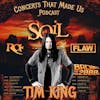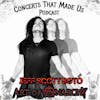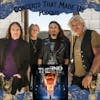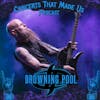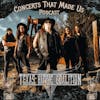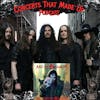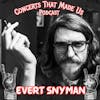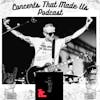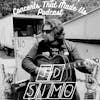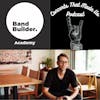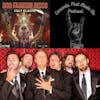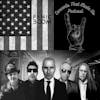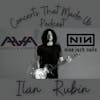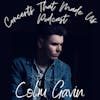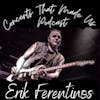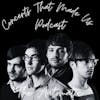Exploring Different Styles: Ronin Talks About the Inspirations Behind 'Valak The Defiler"
In this captivating podcast episode, host Brian engages in a thought-provoking conversation with Chris Feldmann of the rock band Ronin. The focus of their discussion revolves around Ronin's latest album, "Valak The Defiler," a masterpiece that showcases the band's ability to seamlessly blend diverse rock styles into a cohesive musical experience.
Chris delves into the intricate songwriting process behind "Valak The Defiler," shedding light on the band's creative approach and the influences that shaped their sound. He passionately shares how bands like Creed, Metallica, and Tool have played a pivotal role in inspiring his musical journey, and how attending electrifying live concerts has further fueled his passion for creating impactful music.
As the conversation progresses, Brian and Chris delve into Ronin's unique performance style, which sets them apart from other rock bands. Chris candidly discusses the challenges they faced during the COVID-19 pandemic, as live gigs became scarce and the music industry faced unprecedented obstacles. Despite these setbacks, Chris remains optimistic about the future, highlighting the band's unwavering commitment to constantly evolving their music and pushing boundaries.
Excitingly, Chris reveals Ronin's future plans, which include a highly anticipated mini tour to connect with their dedicated fan base and expand their reach to new audiences. He also shares their intention to secure a booking agent, a strategic move that will undoubtedly propel their career to new heights.
In summary, this episode offers a captivating glimpse into the world of Ronin and their unwavering passion for creating impactful rock music. Listeners are treated to an insightful exploration of the band's latest album, "Valak The Defiler," as well as an intimate understanding of their creative process, performance style, and future aspirations. Brian and Chris's engaging conversation leaves no doubt that Ronin is a force to be reckoned with in the rock music scene, and their dedication to pushing boundaries and connecting with audiences is truly commendable.
Find Ronin here:
https://www.facebook.com/ronin.rockband
https://www.instagram.com/ronin.rockband/
Find CTMU here:
https://linktr.ee/Concertsthatmadeus
Newsletter: https://concertsthatmadeus.aweb.page/p/f065707b-2e34-4268-8e73-94f12bd2e938
Save 10% on Band Builder Academy membership by following this link https://bandbuilderacademy.com/Brian_Concerts/join and using promo code "concerts" at signup.
Become a member at https://plus.acast.com/s/concerts-that-made-us.
Hosted on Acast. See acast.com/privacy for more information.
Brian (00:00:00) - Chris, you're very welcome to concerts that made us.
Chris (00:00:04) - Thank you for having me. Really appreciate it, man.
Brian (00:00:06) - It's great to have you. Now. I'm looking forward to diving into your music over the next bit. So Ronan released Valak did a filer back in September. It's a great album. It has many different styles within it. Can you tell us all the details? Spill the beans.
Chris (00:00:21) - Definitely. You know, I feel like it's it's not it's hard to find on the album. It has those different styles and that by design, for the most part, I like to kind of just play what comes to us. And, you know, we workshopped the song there, but we're really proud of one, and we built off our first album for sure to try to just showcase different styles that are inside us. We like to say that we're really any sort of subgenre because there's millions of them in rock music, especially metal. It's like people go on and on. It's, you know, makes you dizzy sometimes with the different subgenres people come up with.
Chris (00:01:02) - So we're not really obsessed with that, but we just we like rock music, playing all different styles of rock music, even if it's the softer sort of quality stuff. And then, you know, some seems a little more heavier screamy stuff we like to kind of live into. So yeah, really happy with the way it came out. Um, you know, we're looking forward to more hearing it and hopefully more people appreciate you said the different styles and offerings that the album has. So it's not like, you know, you're listening. It's like, oh, well, like 4 or 5 songs sounded very much the same, like structure, same vibe. It's like we kind of pride ourselves on, you know, little samplings, rock music here and there.
Brian (00:01:43) - Gotcha, gotcha. And when it came to, you know, writing the songs, everything, where did the inspiration come from?
Chris (00:01:50) - Well, some of the songs we had, um, in the bank, like, like structures of it left over from my first album sessions because initially we do ten songs, but then we got into the studio and we're like, all right, we kind of ran out of money here.
Chris (00:02:07) - We kind of mapped out like, all right, well, we have so many hours that we can log, so we got to get the songs down. So we just picked eight that we knew the best because we really ten of them. But we're like, all right, we take the best. Let's record those. So like two holdovers, Valhalla and Valak, the title track. We're both holdovers from the first album and we decided to kind of build it all around this Valak idea, which came to me. Some random night I was watching the. I think it was The Conjuring. These. With life, and then it's just a line that's like the chick in the movie goes, oh my God, you're Valak, the divine. I was kind of perked up. I was like, that sounds cool. So down. Or I texted it to myself notes, writing it down. No one writes anymore. But so put in my notes and I kind of locked it away. And look, you know what Valak was all about.
Chris (00:03:00) - So, you know, wrote the lyrics around that song and married it with some risks that I had, and then brought it to the band and we sort of fleshed it out. And the same goes for the rest of the songs. The one song monster, which our lead guitarist, Jack takes some lead vocals on that one, because we're pretty fortunate in the band. We have him. He's really vocalist. He went to school for voice, but to have him on the back burner and to be to at harmonies and stuff. So he brought that song to us and our bassist Beau, our newest member, brought the song hatreds Mate to the band. And, you know, we retooled lyrics in like a, you know, around a little bit with the structure and we were able to flesh that one up. But first part we just play, like I said earlier, like what comes to us. And a lot of times I'll have lyrics from like years ago, like even when I was in college, like I took some workshops and like, you know, I'll look at those for inspiration and be like, oh, that kind of sounds like similar to the food of these riffs that we had.
Chris (00:04:05) - Try to song around that. And that's like another thing, like there's no one that we make a song like sometimes it's with just like a jam and all right, that was that's kind of cool. We'll do it later. Or sometimes we'll start with lyrics or a vocal melody and build from there. So we try to attack it from all different ways and the songs are better for it. It's not like one formula that kind of works for us.
Brian (00:04:30) - Yeah, yeah, geez, that's that's handy. It works out like that.
Chris (00:04:34) - Yeah, sometimes it comes together and other times it's a little bit more labor.
Brian (00:04:39) - Yeah, I can imagine. And you know, how does the finished version hold up to the original concept? Did it change much over to the production?
Chris (00:04:49) - Um, for the most part, I feel like it's like half and half like half of the songs. Like, we're pretty much the same studio, um, that we sort of envisioned, like songs like hatreds made, um, and songs like Saturn's Portal.
Chris (00:05:05) - That was our lead single. Uh, big difference with Saturn's portals. Like, we kind of top down the ending a little bit. We had a little more extended with that solo section. Our engineer, Frank Matera at Voodoo Studios was he was phenomenal like he was. He had such a good ear, like, oh, maybe we shouldn't repeat this again. Like, let's like, let's cut this down. Let's try a different chord here or there. Um, he was a big part of some songs changing one song in particular that really transformed in the studio, I think was upheaval, um, which is the song off the album. And that song was like it was kind of a beast. It's like it's a it's a different time signature than we you like. We were playing around with some like it was very Mastodon inspired, like somewhere in there in sections. And, you know, there was some like heavier vocals in the song. So like just having him around to be like, all right, maybe instead of repeating this section, have the double at the end.
Chris (00:06:02) - And then we decided on breakdown at the end of the song to like to make the outro and like, repeating the chorus again, just kind of for variety's sake, not just like, all right, verse, chorus, verse chorus, you know, solo chorus. Pretty standard. So yeah, like some of the songs definitely changed. But as far as signing up to the idea, I think most of them exceeded if not matched, because, you know, it's the editing process that's so important. And I feel like a lot of bands, even us with our first time, definitely struggle with. It's hard to edit your own stuff because it's your tongue. It's like, no, I want this section to be 9.5 minutes because it's such a cool riff. You can do that, you know, bands can, but you know, we don't have the we don't have the legacy, the we can't afford to do that. Like people be like, yeah, I'll listen to ten minutes of this like No Name band.
Chris (00:06:57) - It's like, all right, same theater where it's like, okay, they can put a 15 minutes together. Uh, so yeah, I think the songs definitely stand up to or exceed. Um, the is that we had going in.
Brian (00:07:09) - Yeah, yeah. And I have to ask, when it comes to making new music, then what's your favorite part? And then the flip side, what part D absolutely dread doing?
Chris (00:07:20) - Oh, man, that's a great question. I think just the the birth of the song, sort of like that initial creative spark, especially when you bring something to the band. I mean, that's like a love hate because like when you come up something, you're and then you bring it to the band and you're like, are they going to like it or are they going to like, you know, are they going to crap all over? They're going to be like, yeah, what? Like, this is not this is good. Like this is not great, but just that initial sort of spark, you find the inspiration or, you know, I'm just noodling down on the guitar and I find a cool riff.
Chris (00:07:54) - I'm like, oh, like, that's kind of cool. And then trying to find, you know, that that riff connects with, you know, to build to a chorus or how do you build? So, like, how can I transform this riff to a different, um, like part of the neck guitar to, like, bring a different set about? Because we're very riff oriented. We like to kind of build like find like a riff. We really like we try to find different parts on the guitar and different voicings where it'll sound different, but it's it's the similar structure to keep that consistency through the song, you know, get that earworm thing. Um, but it's like. Maybe what's hardest or what I don't like the most is when you get toward the end of the process. And I always have fear of like getting sick of the song, right? It's like or or the sort of like, oh man, we've been working on these songs for ten months, but I have like, all these other riffs I want to start working on.
Chris (00:08:54) - So, you know, that's it's a little bit of a cop out. But I think, like when you get to the end of the process, even like when it comes time to release, like so excited for these songs to get out. But like the creative part of us is like, oh man, we have all these other ideas on. But it's like, no, we have to give the songs that we just recorded the respect that they're due. So it's sort of like that impatience that comes along at the end of the process.
Brian (00:09:20) - Yeah, the creative itch.
Chris (00:09:23) - Oh, yeah. And it's. And you can scratch it, it seems.
Brian (00:09:27) - Yeah, yeah. How long do you wait then to start working on new music after the release?
Chris (00:09:33) - Um, mean, they're always, like, coming up with ideas like an always, you know, like a riff bank, you know, on on like my voice memos, even some of them are just like my voice doing a riff that did it.
Chris (00:09:48) - And then I'll listen back and be like, what the hell was that? Was that translate like, um, but yeah, like, we're always writing, but. We like. We've discussed it at lead up for this release. Like, let's not consciously work together on material until the album's been out for a little while, and we've given it like some backing up to Canada the beginning of November to open for another band who's there doing their release. So we're in Ottawa and Montreal. We want to make sure, like we play the like, give it the support. Its due both like social media and stuff, pushing it that way, but also with shows and making sure it has time to kind of breathe and, you know, on a life of its own before we, we undercut it with other music. And it's also it's like the financial thing getting back into the studio, like, let's give ourselves like a year or two before we jump in on that again. You know, the more money in the bank to because the eight song structure seems to work for us in the studio.
Chris (00:10:55) - So if we can come up with eight more songs and then we could structure our studio time, the same did with the other two albums, that'll help. But giving the this more time, I think it'll be very important. So but you know, to close out answer to a very long winded answer, uh, we're always writing, always trying to, like, come up with new riffs on our own. But collectively we want to give ourselves definitely a little time, maybe like six months. We'll dive in, we'll see what's going on. Like if we can get more shows out of state and like little mini weekenders and little mini tours, then that'll push off the recording process even further, which is a good it's a good problem to have.
Brian (00:11:37) - Yeah. Yeah, exactly. You can't complain about that. No way. Yeah. And you know, after the release of your 2021 self-titled album, you guys went on a bit of a tour. You played the tri state area and quickly were noticed by Pavement Entertainment.
Brian (00:11:52) - Can you walk us through that period and.
Chris (00:11:55) - Yeah that was exciting. And obviously coming. You know we were still in Covid but sort of coming out of it and you know, because that that definitely put the brakes on us. But it allowed us to record that album. We're able to go in and like take time, like, all right, have nothing else to do. So let's just these eight songs out and see what happens. And you know, in hindsight it was a little bit of a mistake. Release it before the album around to potential labels and stuff like that. And, you know, pavement even said as much and we sent out a bunch of cold emails asking if anyone wanted to work with us on a school and stuff like that. And they basically outrightly said like, oh man, it's a shame you didn't come to us with the album before release. Like, we could have definitely worked better for you guys, but we working one of our songs, temperatures with them, that they really liked and thought had a really good radio and it wound up doing really radio.
Chris (00:12:51) - We wound up getting, I think, to third on the top 40 rock songs on the Billboard charts. Great. You know, we were up there with other bands like Roach, uh, like we're wrestling fans over here. So like, Chris Jericho was up there. We wanted to, like, send him a tweet and be like, oh, what's up, Ozzy? Like, we're nipping at your heels. You know, obviously we didn't do that, you know, be jerks about it. But it was they were really into what we were doing. And we were able to work that song for like 16 weeks, um, on Spotify and on radio. Able to rack up a lot of, like, streams that we're very, you know, we can go one way or the other when it comes to streaming. It's wonderful. That outlet and that access to like, the world basically with your music. But it's like kind of a crapshoot sometime you're not sure how to, you know, leverage those metrics on Spotify.
Chris (00:13:47) - You turn like, oh, wow. We streamed song temperature streamed 125,000 times. All right, but now what? Like how do you. Like, does that matter to people? Hard to tell sometimes. But we were able to do very well with. And then when that pain ended they said, listen, when you guys have more Mike, send it our way and work it out. And then, you know, we came up with the demos for Valak, the album, and they liked it. And they said, when you guys have the final recordings, let us know and we'll work this thing. So, you know, it worked out well for us. And 2021 was a good year. For us linking up with them. And then we got to play with a pretty big metal band except, which was great. That was a cool. That was probably our best show to date. Um, actually, just the size of crowd. That was a great opportunity.
Brian (00:14:40) - Oh, and I suppose at this stage.
Brian (00:14:43) - So we'll dive into your your influences, your early memories to give the listeners a sense of where you come from. So if you can, can you remember your earliest musical memory?
Chris (00:14:53) - Honestly, it's probably something music wise from my father. Um, you know, when you grow up, like your parents, at least in the generation grew up, they were listening to there was a classic rock. It was like Billie Jean, especially. We're from Long Island, New York. So Billy Joel went to like, Elton John. But like, I can remember really catching on to some country music guys like George Strait. Even Garth Brooks and Jackson were pretty big. Like, I'm talking like when I was like probably 6 or 7. And then when I was like 8 or 9, I remember being introduced to Creed. Right. You know, people, people like to read. But listen, when when I heard them, when I was like eight years old, when Clay came out, I remember hearing songs what if and, you know, wrong way.
Chris (00:15:44) - And it being like, you know, this is pretty great. You know, they had their with arms wide open. They hire they had those hits off the album. I always like, like this is pretty rock. And then, you know, Creed was basically like my sort of gateway drug into like rock and music. And then next it was Metallica, probably like 2001. I was a I was like 11 or 12. Me and my cousin pretty always listen to music together and, you know, they came out so like the Doors that we would do chores pretty much in our respective homes, up enough money to try to buy all their albums together collectively. Yes. You know, go to Best Buy or, um, the heck was the name of the store and it was or they Tower Records they used to have like would go to CD shops to buy these and we built up enough money bought like the load reloading and my cousin got its lightning and just and of course, you know, the Black Album we had and we would just listen to those religiously, religiously.
Chris (00:16:54) - So like they were a huge influence. Allison came shortly after Love Jane's especially the unplugged performance that they did on MTV. And then more like my fans, which it's weird to say that they're they're like 25 years old at this point, but like, Avenged Sevenfold was huge. Remember hearing them in 2003, oddly enough, on a Madden NFL football game soundtrack for like, like two or something like that? I remember hearing a song on Waking the Fallen chapter four. I remember hearing that. The hell is this? This is this is awesome. And it was like a little bit bigger than what I was used to. And then, you know, throughout the years. Then I got turned on Mastodon, other bands to bridge, which is basically Creed with Miles city, which, which was I remember being so opposed as a kid when I first heard Alter Bridge. I'm like, no, I'm big guy. Like, no, no. And then I like do a few of the songs. I'm like, this is great, this is awesome.
Chris (00:17:56) - You know, I've seen that like a dozen times. Yeah. So like and then like other bands beat. I remember seeing Metallica in like 2009 and being like, yo, what's this? Like this rockabilly metal? Like, what a unique, like, Elvis voice this guy has was like, this is cool. They had some like sounding songs with like 60 sort of chord progressions. I'm like, this is like, this is really cool too. Um, yeah. So those are like a lot of like my specific is the band. Has different eclectic images that all sort of come together like our drummer loves rock muse, lead guitarist love like Jim Croce. He loves. Sorts of like it's hard to nail his style down. He loves so many things and our basis loves like system of a down. He loves Jocko Pastorius. You know, he comes from he's like ten years older than us. He's 24. He he has a lot of like more youthful energy. He like he's Midwestern emo. When he says, I'm like, what does that mean? Like he plays dead riff and then it turns into like a really heavy, aggressive.
Chris (00:19:09) - I'm like, all right, like that sounds like from like 2003, 2004 different name. But yeah, those are like a lot of the influences. Big ones are probably like Metallica, avenged. Um, DOS is definitely in there. We try to include them, even some tool sometimes like vocals on some songs. Maynard has such a cool delivery, so it's like it's nice to try to incorporate some style of Alice in Chains, like probably the top five.
Brian (00:19:38) - Yeah, I like it, I like it a good mix there. And you know, can you pinpoint the exact moment that made you want to become a musician?
Chris (00:19:48) - Um. Probably, and unfortunately, I didn't capitalize on it for some years after I kind of got the itch because I've always sung in chorus and stuff in high school and choir. Um, but it was never it was like a football Sunday. And I went with my father to his friend Johnny's house. And in between the games, uh, they put on the there was a metallica like DVD set, and it was the 92, I think it was San Diego show.
Chris (00:20:26) - And I remember seeing it was James and Lars. They were doing like, drum off like a drum battle for like ten minutes and just being like, just like mesmerized as an 11 year old being like, what the hell is this? Like, this is so cool. And like, just seeing, like, the adoration that they had sort of the ferocity and, you know, it was very impressionable times. And 11 year old you're seeing that. I'm like, I would love to do that day. And then like, I really got into singing after that, but I wouldn't pick up guitar and like, like a shame to say until I was like five, you know, I tried I tried it like 17, 18 and I just I was such a coward. I quit after about two months trying to. I was trying to do bar chords and I was just like, you know, like, you know, about other things. I wasn't focusing on guitar. Uh, always a huge regret, you know, like, always say, late to the point, but try to be the life of the party.
Chris (00:21:23) - So even though I got the late start trying to make the most of it, I think that was probably when I got the bug where I saw, like, Winston was like, wow, like I need to do something like this. I'm like, either that to be a professional wrestler, it's one of the.
Brian (00:21:41) - Two, uh, two interesting career choices. Anyway.
Chris (00:21:44) - Yeah, pretty similar lifestyles. Definitely.
Brian (00:21:48) - Yeah. And, you know, as a concert. Gordon, what concerts would you say have made you.
Chris (00:21:55) - Ouch. Well, I've seen bands like avenged, Alter Bridge, Metallica, um. Probably like almost a dozen times each. Me and my cousin recently went to at MetLife Stadium in New York or New Jersey, I should say on the the Metallica m 72 tour. So we got Pantera, you know, like the tribute version there, but still cool seeing Phil and Rex up there and, you know, playing with Zach and the band is so good. You know, that's recent like where I was like, I got like weirdly emotional, like me and my cousin because, you know, we were always like to Pantera, but they were never our top end.
Chris (00:22:37) - But I can remember I think it was 2000 when when dime. When time got, I think it was 2004 with Damageplan, and I remember that happening like didn't affect us. But then you kind of think about the camaraderie of those guys, like how much it probably affected them. So liking them live was a was such a cool experience because we never got to see them when they were playing proper. So that was really cool. But probably the first time to Metallica at Madison Square Garden. We got to we were like right up a railing. There was these four guys in front of us, and they brought like this giant magnetic sign from that tour. And one of the, one of the French guys was like a foot tall. So we kept having to pull this down. We're like, I'm like, when you hold that up and no one can see, like, can you? Just over the railing. And he was like, oh, okay. And let him do that. But I'll never forget that.
Chris (00:23:31) - That was a great experience. It was tiring. It was very tiring. The only other time I was probably more tired to heavy Montreal. Up in Canada in 2014. I think Slayer played off Spring Metallic was there. Dropkick Murphy. So we got the, you know for like 13 hours out in the field 50,000 people. Yeah tiring I remember afterwards like and of course you know we're country so you know we didn't none of us thought about like getting cell phone plan so they could be so they could work like, you know, we all got scattered after the concert. We couldn't find it. Like, we just end up all meeting at the gate, like, there was, like, nine of us. And I remember being like, how did we find each other like that? And like, why did we separate? What is so what is wrong with us? But it to war? There were times like the like the pit was pushing us around, just like it was like Gladiator with Russell Crowe.
Chris (00:24:29) - Like we all just link. We're like as one, as one, like we're just getting thrown around. It was. It was like that was a wild concert. So concerts like that and I love music. I love my music. I'll see anything like I've seen maroon five, you know, bad Day, I've seen Michael Bublé. It was like a, you know, Franklin Fracture type singer. I just love, love music. And especially seeing good music that's that's live and tell. Like, you know, the putting their all into it. You know when you can get chills like that's something that's hard to replicate outside of that sort of music thing. So but like yeah probably like that first Metallica especially heavy Montreal because that I'll never forget just being like beaten for 13 hours was quite an experience. I was like, I don't know if this again. And like, I don't know if my body, but those are great concert.
Brian (00:25:28) - Sounds of trees and, you know, your own gigs. Then for any listeners that haven't got one of them, give them the full experience if you can.
Brian (00:25:36) - What can they expect?
Chris (00:25:38) - I mean, see whether it's we have a 30 minutes or luckily, sometimes an hour set. I mean, we're gonna give you energy, we're going to give our all. And like, that's one thing we like to do. We like to do a lot of crowd work. Like, I like to talk to crowd. I like to, you know, we like to show our personalities on stage. We like to move around because there's nothing worse than like, because sometimes the music could be like a thing, but sometimes it just look like the performance of having a great time, you know, especially if it's like more intricate. I understand, like you have to concentrate sometimes it's like, you know, when the people on stage are super into it and the energy the crowd feeds off on them. And like, you know, by design, it's like, all right, I'll give you energy. You got to give us energy back. And like, people respond to that.
Chris (00:26:28) - I know I do see on stage, even bands like I'm not familiar with like you're going for it even if like the notes here, they're, it's like they formance you're looking for, you know, so it's pretty much what we try to live by, like give you the best show we possibly could. You know, we sprinkle a few rivers in there for good measure to kind of people who aren't familiar with us can at least get into it and be like, oh, wow, they played that cover really well, and they kind of maybe pay attention to the original song a little more. But, you know, we're an original band first and foremost. So you're going to our stuff. Definitely. We're not you're not a cover. So you will hear us. And you know it's as thick as you get. Like we don't do the bells and whistles, no smoking ears and stuff like that. You know, we don't like shows or anything like that. Maybe when we get to a certain level we will incorporate some stage theatrics because that also involves people into it.
Chris (00:27:24) - But right now it's like a raw, you know, high show. And I'm going to have a good time. We like to just say it every show. Like, you know, we're here to have a good time and we hope you have a good time. You know, that's really what.
Brian (00:27:39) - Sounds like a good night. And, you know, you mentioned you played a show with. Except when you're playing with guys on that level, what do you learn?
Chris (00:27:48) - I mean, you learn to be on top of your shit for sure. We've been fortunate enough to open for them twice in state, New York and Poughkeepsie at the Chance Theater. That was their first show. And on Long Island in Patchogue, a place called Stereo Guard. And that first show was definitely for us. We had been with Beau, our nicest, for about six months at that point, and we had a half hour. And we were second on out of four bands, including except. And we were just we set out to just like, let's just literally lay it all on the line.
Chris (00:28:27) - Let's play as hard as we can, you know? As hard as I can, you know, I'll crowd work up enough. I'm like, I'll practice in the mirror if I do like little phrases and stuff to to make sure that, you know, because playing in front of except you want to make sure that the nerves don't get to you. They have such a polished live show. Like have they have they have the coordinated like swings. They have the outfits. Obviously their crew, um, is top notch and they travel all over the world. So we did not want to have that opportunity. So we, you know, always tried to pride ourselves on being as professional as possible. But when you get to a band like that, who's legitimate professional touring, you know, it's a different level. And, you know, they were so accommodating, but just making sure that your top of your shit, like, you know, your stuff is, you know exactly what needs to be held in any equipment that you need to hand to them that they need to work with.
Chris (00:29:29) - But it's a well oiled machine. I don't think we could have messed if we tried. Um, so like fortunate enough to do that, but just to. Definitely. Also, we need to just appreciate moments like that because who knows how many times that'll happen. And, you know, in our music career, if I could say, um, the hope is to play a lot of shows like that and it's probably close to a thousand people there. I know Max Kapp at that venue is not 50. So when accept play, it was like sardines. So that place was maxed when they played. When we played. It was tight. But you can move through without having to like squeeze. So 700 people which was we've played to and to this day the most. And you know just getting people involved in our show and like people were you know, they were chanting and doing rocks and stuff like that. And they were coming up, you know, they were they were paying attention to us.
Chris (00:30:23) - And that's really what's important. And we got a lot of reactions after songs. So I guess really learning to appreciate moments like that, because who knows how many times it'll have. It's a tough business. It's not. There's definitely zero. So getting to do that once. You know but not you know, we got to do it twice which was great. And you know just not being not taking those things granted. But also always making sure you put your best, not just your best foot forward, but like you show the best who you are in those situations, like to show that you have a level of professionalism and you know, they let us open for them in time. So like that was awesome for us. Like so we proved that not only could we handle the music side, but also the backstage side of it. Like we didn't cause any problems, you know, we didn't cause any hiccups. We didn't take too much time. You know, we stayed with our set time. You know, we weren't trying to liberties, you know, we weren't being dicks to anybody.
Chris (00:31:24) - We were being very gracious and respect to everybody because, you know, the low tempo. You can't walk around like you, you know? You know, big dick on campus, you know? So, you know, you can't do stuff like that. So just making sure you stay humble and, you know, don't step on anyone else. Those, you know, some people might say different where, you know, you should be a little bit more aggressive like that. But to us that's not going to get us any points. You know like like some people will work out for them. But I feel like that's the exception. Like you should always just be personal and respectful as possible. So that's one of the things we definitely learned.
Brian (00:32:05) - Yeah. Yeah it's good. It's good point. And you know that's obviously the best one you've played. If you flip that around now, is there a gig that you would say is the worst experience you've had and how did you deal with it?
Chris (00:32:17) - Oh, definitely.
Chris (00:32:18) - Um, and honestly, it's a gig we didn't even get to play. Um, we had gone into Brooklyn for a show, a place called purgatory. Probably should have taken that as the first sign of things to come. The only saving grace, and I'll lead the story off of this is that we got paid in advance for it. So like we money regardless. But we wanted to play. Originally we were supposed to go on like 1131 shows with a lot of bands. We show up and I have my Mason four by 12 cabinet and I have dual rectifier amp head. We're talking like £100 of equipment. We walk in, I was like, oh, okay, this place looks like, oh, well, the place you guys are playing is there. So I was like, I'm like, all right, stairs and look. And it looked like it was out of like a movie or something. The staircase that never ends. And it's like nice and tight in the hallway. I'm like, am I supposed to? So I lug all the stuff there.
Chris (00:33:18) - We lug all the equipment up. And we're sitting there where we are. It's like 11:00 and they're like two bands behind. We're like, oh. Like, all right, we're not going to go on to like one. All right. Okay. That's fine. It's 1230 and there's still like a a behind. We go to the border, we're like, you know what's going on? Like. You know, we were supposed to half hour ago and or an hour ago. Really? And you know what's going. Oh, you'll get on, you'll get on, we promise. And it was like 130 and they were still like, oh, there's actually another act. And we were just we're out of here. We got into it a little bit with some people, but we're like, listen, like we can't. 230 you told us you 1130 or 1230, whatever you said, like, and you kept moving the goalposts like we came out here, we brought all of our stuff. Like this was a whole day.
Chris (00:34:13) - And like, some of us have work in the morning, like, so that sucked. That's tough because, you know, we just want to play. Yeah. You know, you got to play. That would have been cool. But like, that was just a it's just the stairs with the equipment. I remember having a lot of adrenaline at the show, so going down the stairs wasn't so bad. I remember being a little angry, a little beside myself. But yeah, so that's that's the flip side of the exception.
Brian (00:34:42) - Right? Well, hopefully there are few and far between.
Chris (00:34:46) - Yeah, luckily that has not happened since. But you know, it's one of those experiences like I feel like everyone needs to have something like that. It's a it's a good story and it's, you know, we look back and it's just funny and then we're like, oh, well, I'm like, we still got paid. That was cool.
Brian (00:35:02) - Yeah. True, true. And you know, since you started the band, what's the biggest challenge you guys have faced?
Chris (00:35:11) - I mean, Covid was definitely a big one because we formed I mean, the initially formed, it was me and the original bassist, our buddy Andrew.
Chris (00:35:22) - He had. It was a long trip to Atlanta for one of our buddies bachelor parties, and he was talking. He wanted to start playing bass and I had only picked up the guitar. I was like, I'm like, just do it. I'm like, you come over and we could jam. I could show you what I know, which is very little. I'm like, I could show you some power and stuff if you just want to, like, you know, root notes behind me and, like. So we went for about a year and a half like that. Just me. And then we got his body. Um, Jack did the artwork for the first album. You play drums with us for like, half a year, and then he wanted to focus on art, so he backed out. And then we called up our boss, Justin, who's the drummer now because he played drums in school, and he came over, jammed with us a few times. Like, you guys want to try to record some songs.
Chris (00:36:11) - We made like a little EP, a little demo EP in my basement. We recorded tools. Uh, we did that. And then we got Jack involved for lead guitar. But then Covid hit. We recorded the end. And then, you know, happens sometimes. Our buddy Andrew was moving with his fiance to Texas. So, you know, we took a few months and we're trying to figure out, like, if we could make it work. And we just decided like, it just couldn't. So then we put out a. Uh, not like a flyer, but sort of like a Facebook version of Craigslist for missions. So I put out like some ads there for, you know, looking for a basis. You know, we put links to our music and oh, answered it. And he had actually known about the bands. He was looking for the music beforehand, which was cool. Well, like, should we have a fan? That's awesome. There's one. Uh, so he came down, he auditioned.
Chris (00:37:14) - We play a few songs off the album and then cover that we like to do. We like to do For Whom the Bell Tolls. Uh, a nice rock and Metallica song that everybody knows. So that always gets people involved. And we played that. We played a few of the, the album and we, we pretty quickly and we were able to get him on board. But so the biggest challenge we face was and then also our, our buddy and moving, you know, because we were oh man came out with this album. Like now what we do. But luckily Beau was the right place at the right time and we were able to link him and we didn't. We didn't lose steam. You know, he missed like a year of gigs, which just stunk because, you know, that's where, you know, you cut your teeth, you kind of get a lot more comfortable. But we had we had gigged a lot in 2021, 2022. So we were able to kind of get ourselves reactivated because it's different than rehearsing at home.
Chris (00:38:13) - Yeah. So Covid probably the biggest challenge and then losing the bassist. So so after that.
Brian (00:38:20) - Yeah, yeah I gotcha. And if you think about the band and the future, how would you like the band to evolve? What would it be like in, say, five years time?
Chris (00:38:30) - Mean, we want to get a couple more albums there. We're toying around with the idea of an EP. Um, we're not sure because we really the album, the idea of the album, uh, you know, and maybe that's just us, you know, digging our heels in with that old school mentality, an album. And, you know, maybe that's the part of us, but we, we at, uh, but definitely want to have at least another album or two out there of material play around, maybe some drop tuning. I know that's one thing Bo, our bassist, has been talking about. We have a few songs where we have, like in the bands that are in drop tuning, something I'd never really experimented with.
Chris (00:39:12) - Too much time I do, I have a great time. It's just like it kind of lends itself to just, you know, those big power chords. And yeah, it has that cool, deep sound. Soundgarden, like some of those Soundgarden riffs like, oh, now I know why they came up with this. I'm like, this is so much fun. This is great. Uh, and just to keep just moving on the quality because I feel like definitely the first album, I'm very happy with it. I really love on it, but I feel like we made the songs more concise and they're better for it. I think the editing process with the second album is definitely better than the first album, because some was just that, like, you know, we know what we were doing. We just had songs. We're like, all right, let's record these songs that we have, rather than workshopping them a little bit further and like making them a little bit more tight, uh, a little easier to digest.
Chris (00:40:07) - So just to keep evolving, keep adding different styles. Sounds like I talked about the drop tuning, just another aspect of rock music. And to make sure also we just stay true to ourselves and try to. Will conform to anything else. You know, we like to add new elements in there, and obviously the modern sort of rock metal sense that maybe we don't have, but we think that kind of gives us a little bit of advantage in the field. Does it help stand out a little bit? Um, and some people are like, it's not really what we're looking for because it's not what everything else sounds like. But then other people now this is like refreshing it. This is a nice throwback, which is, you know, that's. I'll, uh, but just to keep pushing ourselves musically because we definitely did on this on the second album to the first, just trying different time signatures and stuff like that. Um, and just, you know, but like I said, just being authentic and, you know, always just playing music that we love.
Chris (00:41:12) - You're not trying to not try to be something that we're not. That makes sense.
Brian (00:41:16) - Yeah, I like it, I like it. And before we dive into the last couple of questions, then future plans in the near future that are set in stone. Anything you want to share with us?
Chris (00:41:25) - Well, I mentioned earlier the the little mini tour, which is we're very excited about. It's been able to play two big cities, Ottawa and Montreal. And the venues are cool. They're pretty big size, so and they're going to be very well attended, which is great, which I always love to see that. And our numbers, you know, not too Spotify again, but our numbers in Canada can be solid in those cities. So people are getting primed and ready for come up there, which is cool to see. Uh, so we're very much looking forward to that. And we're hoping to hook up with, um. We've been shopping around for, like a booking agent. Like a manager.
Chris (00:42:07) - So if we can get those things secured, I think the shows will start in a lot more. Be a lot easier to do that because it's a lot the, you know, that DIY mentality, you know, the self sort of mentality when it comes to being in a band, especially like, you know, working day job musicians, it's even tougher, you know, so trying to balance that and then also book all the gigs and, you know, making sure like even like lining up the interviews. It's like making sure checking with the other band members, it's like, all right, well, what are you available? Can you do this? Can you do this? It's a lot. So like, you can get a manager and a booker to help us with that aspect. It would take a lot. A weight off of it. So we can create an like other aspects like and we can more promotional stuff on Facebook. And you know, media is another one of those things where a like take it or leave it, but it's very sort of evil.
Chris (00:43:02) - You have to like. I feel like if I have a band, I probably wouldn't have a Facebook right? But it's like one of those necessary things like that you kind of need and but, you know, those are the types of things that I think are on the horizon for the band, probably within 6 to 12 months. So just more shows and hopefully getting on some. Maybe the bills next summer would be really cool the next festival season. It's like we feel like we're right on the cusp. Like if, you know, if we weren't going to release the album, I feel like we might have been like jump on a few this past summer, so hopefully chance to do that next summer would be huge for the band because that that exposure, you can't, you know, it's hard to put a price on that exposure, especially stage of what what event are you playing at? What are headlining like. Things play a factor and if we can get on those. But that's where we're looking at trying to get a booking agent and a manager to kind of, you know, people who know what they're doing.
Chris (00:44:05) - Sometimes it's like you're just sort of throwing crap at the wall and hoping sticks with like a lot of times bookers or like at the venues won't respond to like holdouts to people that they know with. And I can't blame them. They probably get inundated with emails and like so many of them, are junk or like bands that are in a serious and like they want they want to bring money in. So they're not going to respond to everybody. So if we can get sort of their foot in the door in a few places, I mean, that's really what it comes down to is actions. And that's, you know, you say that it's not who you are, it's who, you know, there's a lot of there's a lot of that. Who you are definitely becomes very important. Once you get you get invited to the table. Better be somebody like that's wild or else you know they're going to kick you out.
Brian (00:44:56) - Yeah, exactly, exactly. And we'll dive into the last couple. So these are a few random odd music questions, but I'm intrigued to see your answers.
Brian (00:45:04) - So if you could see anyone from history in concert for one night only, who would it be?
Chris (00:45:11) - Who? That's a that's a good one. Probably. I would love to see. It's it's between two. So I'll give you two kind of Stevie Ray Vaughan. I would have loved to see live. His guitar sound is it's like legendary. He's a student of Hendrix. Um. And I just love just his vibe live. He was so much passion to it. Uh, you know, he was like the king of the mouth movements, playing guitar, you know, like John Mayer and stuff. Like people meme about him. But Stevie Ray Vaughan, like, he just felt note and you could see he had giant hands bending the strings to kind of snapping like, and like heavy, you know, like nobody in a string like him just. But to see that live and then the one would be Queen with Freddie Mercury would definitely be. Just seeing like nobody, you know, handle the crowd better than you see that in all the live like the Live Aid thing that they did his last performance just I mean, what a performer.
Chris (00:46:23) - So like seeing him with Queen back in the day would have been awesome. And then also I'd probably say Stevie Ray Vaughan.
Brian (00:46:31) - Very good ones there. Now here's where the odd part comes in. If you had to spend 24 hours locked in a room with any musician from history, who would it be?
Chris (00:46:41) - Who locked the room for 24 hours. My default answer would probably be Hetfield would be James Hetfield from Metallica. Just so I could pick his brain and talk to him for 24 hours, because I could probably spend the entire 24 hours with him. I don't even know if he'd get a word in edgewise. Uh, him. Uh. Yeah, I think it's just I think that's the no brainer for me just to pick his brain because I find his life fascinating. You know, everything he's through and like his upbringing and just, you know, all the just what goes through his mind when he writes a riff or if anything goes through his mind. And I know I've like, interviews, talk about it, and it just kind of comes to him.
Chris (00:47:28) - But just to be kind of like chat him up about things and just, yeah, choose him.
Brian (00:47:35) - Pretty good. I wouldn't mind up myself now. And the final one. So what song would appear on the soundtrack to your life?
Chris (00:47:43) - Ooh! Soundtrack to.
Chris (00:47:45) - Life. That's a good one.
Chris (00:47:49) - Mm. Yeah, that's a really good question.
Chris (00:47:57) - Uh, people.
Chris (00:47:58) - Usually get stumped on this. This is a tough one. All right, so the song doesn't have to represent my entire life. No, it just has to be the sound. This has to be on the soundtrack. So. It's still a tough one. Let's do. Um. Oh, man. You're killing me with this one. So it's probably going to be. A song by. Probably going to be a song by Metallica. And I don't want to say that because that one's a little too depressing, right? But I feel like I feel like it would be fitting maybe for, like, the last song on the soundtrack.
Chris (00:48:54) - If it was, if my soundtrack was played at the life or something at the, at the, you know, funeral home. And I would maybe that in the last slot. Yeah, yeah, we'll do that. We'll do that. Sake of time. For sake of time. Because I could probably sit here for hours and think about.
Chris (00:49:14) - Yeah.
Chris (00:49:15) - Slot that in on the last track on the soundtrack. Life.
Brian (00:49:19) - Brilliant, brilliant. Listen, Chris, it's been an absolute pleasure. Thanks a million.
Chris (00:49:24) - Thank you so much for having me. Appreciate you. You know, supporting us. Listening to the album, I'm glad you're digging it and giving me the opportunity to have a platform to kind of spread the word about and appreciate it.
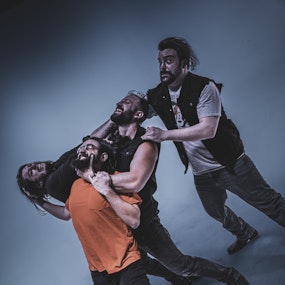
Ronin
Ronin’s exhilarating brand of unique hard rock and charged live shows have earned them a reputation as one of the Northeast’s most exciting acts. Following the release of their 2021, self titled album, Ronin took the road playing across the tri-state area. It wasn’t long before they caught the eye of Pavement Entertainment who helped push Ronin’s Single “Temptress” up the Billboard mainstream rock charts – peaking at #23. They’ve shared the stage with ACCEPT and soon people will be saying they’ve shared the stage with Ronin.
Ronin is:
Chris Feldmann - Rhythm Guitar/Vocals
Jack Mauro - Lead Guitar
Bojack Hernandez -Bass Guitar
Justin Maas - Drums
Featured Episodes
Here are some great episodes to get started with


















